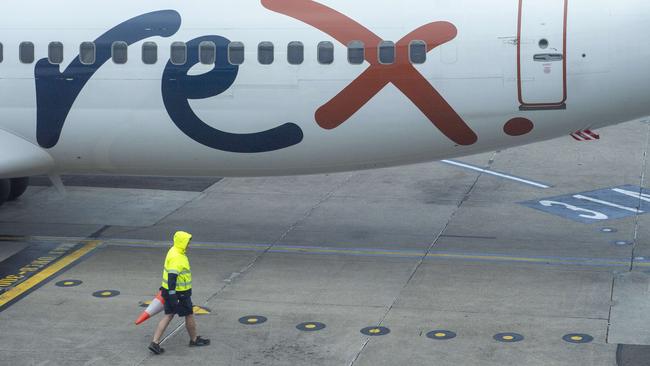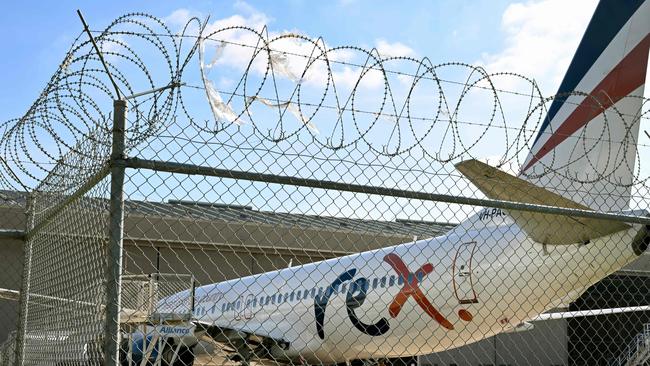Rex bet the house on getting bigger and lost
There was a simple reason why the regional airline stumbled. And without a capital city challenger, we are all going to suffer.

Business
Don't miss out on the headlines from Business. Followed categories will be added to My News.
The rule of thumb in domestic Australian aviation is no more than 2½ airlines at any one time – with the “half” being the sum of all regional or charter carriers in some form or another.
With Qantas and Jetstar under the same roof and Virgin settling in post pandemic, Australia’s domestic aviation market is about to revert to its long-run average. Rex, the regional upstart who bet the house on taking on the big airlines in their own market, entered administration under EY late on Tuesday. The airline will keep flying regional routes and fly-in, fly out services for miners, for now.
The loss of much-needed competition in aviation is bad for all of us. The post-Covid Qantas and Virgin are more profit focused than before and the exit of a capital city player makes it easy for them at the markets.
Putting the chaos of undercapitalised and poorly run Bonza aside for a minute, Rex stumbled into the same issues that all that had gone before it suffered. It simply ran out of cash.
Regional aviation specialist didn’t have the balance sheet heft to crack the duopoly. Even Virgin Australia experienced an equally cruel end in the early days of Covid, where years of losses meant it didn’t have any capacity to absorb major external shocks.

To be fair, while Virgin was in administration the Covid-19 groundings were also damaging Qantas. After bleeding cash, Qantas found itself in the deeply worrying position of being just six weeks from collapse. Qantas refinanced its planes and sold off property through Covid and then tapped shareholders for nearly $2bn just to keep alive.
Rex, a minnow valued at less than $100m, simply didn’t have investor depth or balance sheet heft to continue supporting the losses.
Apart from country cheer and infrequent flights, and without being an aggressive challenger, Rex struggled to find a sustainable proposition to fight for capital city passengers.
Boardroom coup
ASIC questions around a related-party transaction led to a boardroom coup in recent weeks that saw the ejection of founding shareholder, the Singapore-based Lim Kim Hai.
As well as rift in strategy, the former executive chairman, who had been obsessively running the airline from outside Australia for decades, was now agitating from the outside.
The boardroom rift has been complicated by Singapore private equity firm PAG that has funded a $150m loan by the way of a convertible note.
The boardroom break-up provides the spice, but it was the lure of becoming a bigger national player under Lim than what Rex’s tiny balance sheet could sustain that was behind the downfall.
For much of the past two decades, the airline that emerged from Ansett Australia’s regional offshoot was laser focused on flying passengers around regional Australia. It operated a fleet of more than 60 Saab 340A/B turboprops that became the connection for many in regional Australia getting back and forward to the big cities for business or family. The big money-spinner route was Sydney Canberra, although it pulled the plug on that in late 2022 to focus on capital cities. The Saabs were cheap to run, easy to fill and crew, which is the key to staying alive in aviation.
However, with a wounded Virgin through the pandemic, Rex sensed an opening to become the second player in Australian aviation. After Virgin was recapitalised and its debts largely erased, the only surprise about Rex’s audacious plan was it managed to hang on this long.
Rex wanted to fly from capital to capital and took on a fleet of Boeing 737s which were nearly all used-Virgin jets sold in the fire sale. Included in this was the all-important golden triangle of Melbourne-Sydney-Brisbane, as well as other capitals including Hobart and Perth. The new strategy required more staff and airport slots. The jets needed to be full and were cash intensive. This saw losses deepen without the revenue uplift needed.

Indeed in Rex’s most recent lodged accounts – the very peak of the domestic aviation rebound – Rex’s costs increased 15 per cent while revenue was up just 3 per cent. In financial 2022, its first full year of national routes, Rex posted a loss of more than $46m and losses kept following.
So too Rex found itself squeezed on capital city routes by both Qantas (and its Jetstar offshoot) as well as Virgin. Rex’s limited fleet means it was unable to offer the frequency of services of its bigger rivals.
Political heat
Regional flights work on rigid route planning, but capital city connections work on passengers flying at a time that suits them. With rising interest rates cooling the domestic travel market, Rex had limited pricing power against rivals in the chase for share.
At the same time, Qantas’s regional brand was taking on Rex in its own regional markets, forcing a discounting response. This only added to losses when Rex needed reliable cash.
Now the demise of Rex is a big headache for the government. It can’t afford to let the already dominant Qantas become the only regional carrier. Rex too was the beneficiary of more than $100m in taxpayer support since Covid.
It’s another high-profile business headache Canberra doesn’t need, and having a one airline regional town could see ticket prices quickly rise. Treasurer Jim Chalmers says the expected demise of Rex was a concerning development. “We want there to be good regional air routes and we want to move easily and cheaply in regional Australia.”
Is there a solution? Virgin Australia is understood to have previously studied Rex – even under new ownership of Bain capital. But Virgin remains burned from its ill-advised acquisition of loss-making carrier TigerAir as the nation’s second-biggest carrier was locked in a war with Qantas, chasing market share over profit.
There could be a proposition for Virgin. It desperately needs more planes in the air and the backlog of new orders means it will be waiting for some time. Virgin’s old jets now owned by Rex could immediately fill the gap. This would sweetened by airport “slots” that Rex controls.
Meanwhile, having a more comprehensive regional network allows for a fuller proposition as Virgin readies for another run at the ASX. Without the appointment of a new chief executive, the window for Virgin’s initial public offering by the end of this year is rapidly closing.
Virgin could play the card that Qantas does so well and leverage government guarantees or cheap loans to keep Rex’s regional operations intact. However that is not a confidence boost for a long-term business model.
After failing to get its Alliance Aviation bid away amid competition concerns, Qantas would be restricted from bidding.
Rex could yet emerge from administration by ditch its national ambitions and revert to the cheap and cheerful regional player it once was.
However this will need a new management and patient capital which is in short supply. The skinny returns on offer wouldn’t be worth the investment or the heartache from big name private equity.
Through its near quarter century of operation Rex came close to collapsing twice. But in the third time the regional upstart bet the house and lost.
johnstone@theaustralian.com.au
Originally published as Rex bet the house on getting bigger and lost



